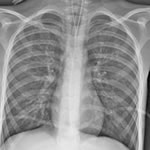Approach
Treatment depends on the severity of the symptoms, which can range from those of a mild upper respiratory tract infection through to severe lower respiratory symptoms requiring ICU admission and ventilation. Patients with acute flaccid myelitis (AFM) require immediate clinical intervention. Clinical status can deteriorate rapidly in those who are severely affected.
Mild upper respiratory symptoms
Most patients with enterovirus D68 (EV-D68) infection have only mild upper respiratory symptoms. The illness is typically self-limited and no specific therapy is indicated. In the US, the US Centers for Disease Control and Prevention (CDC) recommends treating symptoms in people with mild non-polio enterovirus infections.[48]
Patients with asthma or severe unexplained lower respiratory illness
Patients with previously diagnosed asthma, chronic lung disease, or wheezing may be at increased risk of developing severe lower respiratory symptoms or asthma exacerbation. Patients with severe unexplained lower respiratory symptoms present typically with wheezing in EV-D68 infection.
Clinical deterioration may occur rapidly. It is important that all patients with asthma have an asthma action plan. CDC: living with asthma Opens in new window Patients with asthma should be encouraged to take daily actions to control asthma; adjust medication in response to worsening asthma; and seek medical care as appropriate, particularly when experiencing an exacerbation. Supportive care measures for patients with asthma exacerbation related to EV-D68 are the same as for asthma exacerbation generally. Measures for these patients may include continuing inhaled corticosteroid therapy, the use of short-acting beta agonists, and consideration of systemic corticosteroids. See Acute asthma exacerbation in children.
In more severe cases, supportive care may include the monitoring of oxyhaemoglobin saturation, use of supplemental oxygen, and close observation of clinical indicators of respiratory distress. Indicators of respiratory distress in asthma include:[49]
Level of breathlessness
Alteration in mental status
Alteration in heart rate or respiratory rate
Presence or absence of wheezing
Use of accessory muscles, and
Presence of pulsus paradoxus
Management should occur in a setting that can provide access to appropriate paediatric subspecialty and critical care support in the case of sudden clinical deterioration.
During outbreaks of EV-D68, hospital resources may be strained due to the large number of paediatric patients requiring medical care for asthma exacerbation and severe respiratory symptoms. Among hospitalised children, need for intensive care support is common. Although most patients respond promptly to standard status asthmaticus therapies,some require mechanical ventilation.[Figure caption and citation for the preceding image starts]: Chest x-ray of a child with EV-D68 intubated for status asthmaticusFrom the collection of Dr Charles B. Foster [Citation ends].
Acute flaccid myelitis
AFM is a clinical emergency. Patients require immediate medical attention, and ideally, subspecialty consultation from a neurologist and an infectious disease consultant.[50]
Patients should be monitored closely for the development of respiratory failure. Patients with AFM may deteriorate rapidly; over one-half are admitted to intensive care and 23% require mechanical ventilation.[51]
Long-term follow-up is essential, because improvement in motor function may be prolonged, and is often incomplete.
No targeted therapies or interventions have shown definitive efficacy in the treatment or management of acute flaccid myelitis. Evidence is predominantly from small case series and case reports; clinical trials are lacking.[50]
Use of this content is subject to our disclaimer